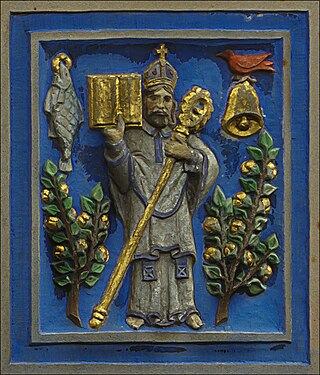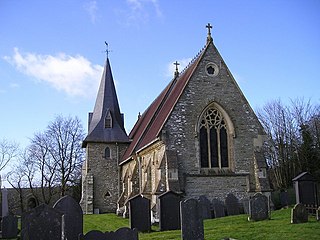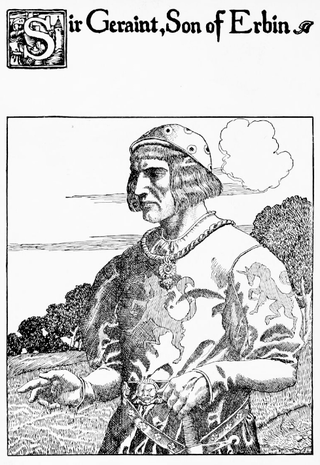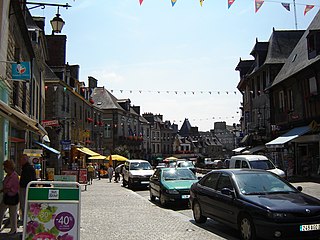
Kentigern, known as Mungo, was a missionary in the Brittonic Kingdom of Strathclyde in the late sixth century, and the founder and patron saint of the city of Glasgow.

Llandeilo is a town and community in Carmarthenshire, Wales, situated at the crossing of the River Towy by the A483 on a 19th-century stone bridge. Its population was 1,795 at the 2011 Census. It is adjacent to the westernmost point of the Brecon Beacons National Park. The town is served by Llandeilo railway station on the Heart of Wales Line.
Medieval Welsh literature is the literature written in the Welsh language during the Middle Ages. This includes material starting from the 5th century AD, when Welsh was in the process of becoming distinct from Common Brittonic, and continuing to the works of the 16th century.

Saint Cynllo is a British saint, who lived in the late 5th and early 6th centuries, generally described as a brother of Saint Teilo. Cynllo was known for "...the sanctity of his life and the austerity of his manners."

Geraint is a character from Welsh folklore and Arthurian legend, a valiant warrior possibly related to the historical Geraint, an early 8th-century king of Dumnonia. It is also the name of a 6th-century Dumnonian saint king from Briton hagiographies, who may have lived during or shortly prior to the reign of the historical Arthur. The name Geraint is a Welsh form of the Latin Gerontius, meaning "old man".

Dol-de-Bretagne, cited in most historical records under its Breton name of Dol, is a commune in the Ille-et-Vilaine département in Brittany in northwestern France.

Saundersfoot is a large village and community in Pembrokeshire, Wales. It is near Tenby, both being holiday destinations. Saundersfoot lies in the Pembrokeshire Coast National Park and on the Pembrokeshire Coast Path. The village population was 3,361 in 2011. while the community had a population of 2,628.

Dubricius or Dubric was a 6th-century British ecclesiastic venerated as a saint. He was the evangelist of Ergyng and much of south-east Wales.

The Book of Llandaff, is the chartulary of the cathedral of Llandaff, a 12th-century compilation of documents relating to the history of the diocese of Llandaff in Wales. It is written primarily in Latin but also contains a significant amount of Old and Middle Welsh names and marginalia.

Saint Oudoceus (Latin) or Euddogwy (Welsh) is generally known as the third Bishop of Llandaff in South Wales. In reality he was probably a 7th-century bishop at Llandeilo Fawr. Wendy Davies puts his episcopal reign between about 650 and 700.

Padarn was an early 6th century British Christian abbot-bishop who founded St Padarn's Church in Ceredigion, Wales. He appears to be one and the same with the first bishop of Braga and Saint Paternus of Avranches in Normandy. Padarn built a monastery in Vannes and is considered one of the seven founding saints of Brittany. Padarn's early vita is one of five insular and two Breton saints' lives that mention King Arthur independently of Geoffrey of Monmouth's Historia Regum Britanniae.
A Gŵyl Mabsant, also known as the patronal festival or Wake of a parish, is a traditional Welsh festival held annually in commemoration of the patron saint of a parish. Prior to 1752, the corresponding fair was reckoned by the Saint's Day according to tradition or to the official Catholic or Anglican Calendar of Saints; following the shift to New Style dating, however, the fair was reckoned eleven days later. By the 19th century, the fair often began on the following Sunday and then lasted between three days and a week.

Llywel is a small village located on the A40, about 4 miles (6.4 km) west of Sennybridge in Brecknockshire, Wales. The Afon Gwydderig runs through the village, not far from its source. Llywel also gives its name to a community. The main settlement in the community is Trecastle. According to the 2001 Census the population of Llywel community is 524, falling to 497 at the 2011 Census.

Sir David Mathew, was a Welsh Knight. He was Lord of Llandaff and Seneschal of Llandaff Cathedral, and one of the ten Great Barons of Glamorgan, a Marcher Lord. It was said he was one of the most distinguished men of his age and a zealous supporter of the Yorkist cause. After saving the life of King Edward IV at the Battle of Towton in 1461, he was appointed Grand Standard Bearer of England and King Edward IV granted the use of 'Towton' on his arms.

Saint Teilo, also known by his Cornish name Eliud, was a British Christian monk, bishop, and founder of monasteries and churches. He was from Penalun (Penally) near Tenby in Pembrokeshire, south Wales.
Budic II, formerly known as Budick, was a king of Cornouaille in Brittany in the late 5th and early 6th centuries. He was father of Hoel as well as several Celtic saints.
Aergol Longhand was a legendary king of Dyfed and son and heir of King Triffyn Farfog.
The Synod of Chester was an ecclesiastical council of bishops held in Chester in the late 6th or early 7th century. The period is known from only a few surviving sources, so dates and accounts vary, but it seems to have been a major event in the history of Wales and England, where the native British bishops rejected overtures of peace from Augustine's English mission. This led directly to the Battle of Chester, where Æthelfrith of Northumbria seems to have killed the kings of Powys and (possibly) Gwynedd during an attack on the ecclesiastical community at Bangor-on-Dee.
Isfael or Ismael, often anglicized as Ishmael, was a 6th-century medieval Welsh bishop of Rhos and saint. He was allegedly also a Breton prince of Armorica.
Saint Teulyddog was a medieval Welsh saint.













